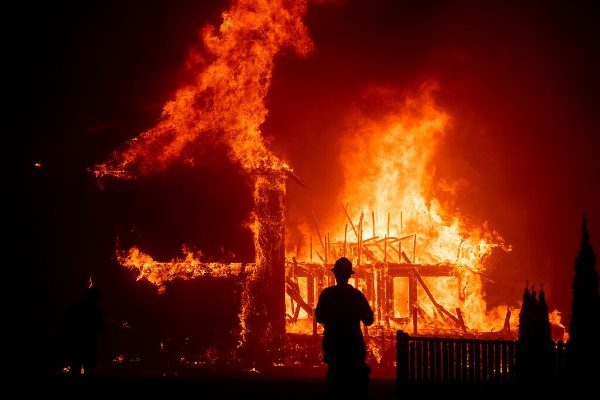
Eighty-five dead, tens of thousands of homes destroyed, and 95 percent of an entire region burned down by something resembling a post-apocalyptic hellscape. Those were statistics of what befell the town of Paradise, California, on November 8, 2018, after the devastation of the state’s deadliest wildfire on record. Ron Howard’s new documentary Rebuilding Paradise revisits those numbers through a more human perspective, focusing on what he calls the “story of a town” defying hardships over the course of a year.
Shot cinema verité style, the film explores the town’s economic and moral recovery. Emotionally, it succeeds, but its most impressive feat is its opening 10 minutes. Compiling dozens of cell phone recordings into a single reel, Howard creates an unnerving first-person perspective of families desperately struggling to navigate their way out of the firestorm in their cars. With its all-encompassing murky orange and brown haze, this sequence looks straight out of the nuclear fallout scene from Call of Duty: Modern Warfare, so unnatural you can’t believe it really happened. It’s telling that something as simple as seeing clear skies could provide such emotional catharsis, but it works because you’re literally in the passenger seat with those experiencing this terror.
Of course, Paradise’s nightmare didn’t end once the fires were put out. Howard follows a handful of locals as they navigate various hurdles to rebuild their town and its displaced community of nearly 26,000. Two prominent faces include former mayor Woody Culleton and police officer Matt Gates, who regularly interact with the townspeople and reveal insight on what their neighbors lost and what they think can be recovered. It’s not easy, however, given all that’s transpired. The damage is so severe that thousands of residents no longer want to return home, and those that remain must content with the bureaucratic obstacles hindering a quick recovery.
Of those profiled, superintendent Michelle John stands out as the most compelling figure. Aided by her husband, Phil, Michelle’s leadership is an extension of her positive connection to the town’s schoolchildren—many of whom have now been displaced—and her desire to see her eldest students get the graduation ceremony they deserve. She’s also present at a number of meetings where the townspeople must content with the closest thing the documentary has to villains: corporate/government entities like FEMA and PG&E.
The former nearly comes up short providing much-needed damage recovery funds, while the latter is called out for one of their faulty transmission lines sparking the initial fire. This is the most movie-like section, complete with an Erin Brockovich appearance, but there’s still satisfaction in watching someone get chewed out for Paradise’s losses. Mother Nature can’t be sued, so corporate greed is the next best thing.
Produced by National Geographic, Rebuilding Paradise is nevertheless disinterested in generating larger environmental or political discussions about wildfire awareness. While Howard features a clip of Trump butchering the town’s name, blame is mainly directed at political and media figures across the spectrum for only taking an interest in the town when it is newsworthy, then discarding it for the next big story. The impact of climate change on California’s drought conditions and regional temperature is discussed near the beginning, mainly to reinforce how much the town has suffered.
This is not a film about combating such magnitudes of destruction but rather understanding what it’s like to live through the disaster’s aftermath, which fits into its core message: Paradise’s strongest ally is itself. The film gradually builds a narrative of renewal through various community gathering events designed to boost morale, an effective contrast to how Howard’s profiled subjects bottle their pain and PTSD. For them, the need to process their community’s collective grief comes first as a moral responsibility so that everyone can properly heal.
So often breaking news tragedies feel like mere headlines devoid of emotional stakes for those who aren’t involved. Rebuilding Paradise deviates from this perception by making us linger on every destroyed house, store, and building until we understand what they mean on a personal level. When one student later talks about donating to other natural disasters in the country, she says it with a newfound understanding, knowing what it is like to lose everything. Ironically, with the majority of Americans currently at the mercy of a Covid-19 death count that surpasses so many disasters, this message can’t help but feel well-timed.






Leave A Comment